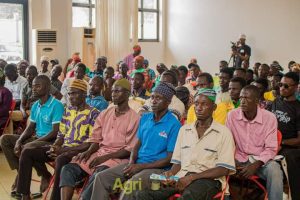
The 2024 WFF Flagship Event Recollections: A World of Food, Learning, and global Friendships

Walking through the most spectacular food-themed wall murals in passageways and halls of the United Nations Food and Agriculture Organization (UN FAO) building in Rome, early this October for the World Food Forum flagship event, forcefully brought to my mind, the vital relevance of food to all communities globally, regardless of borders.
GATHERING OF THOUSANDS
Over a thousand people across the globe had gathered for this significant event to address the issues and challenges of meeting UN’s Sustainable Development GOAL (SDG) 2, achieving Zero Hunger, through localized youth-led actions.
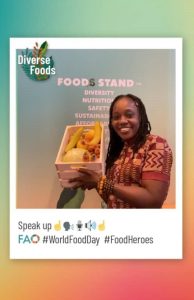
Through this remarkable event, and the lessons learnt, I have come to the realization that, people may be divided by language but, certainly, not by food, nutrition and food systems.
 My heart leapt and glowed, when I lifted my head up and saw flags of all countries, neatly fitted on the upper walls of the UN FAO hall. It was simply exhilarating!
My heart leapt and glowed, when I lifted my head up and saw flags of all countries, neatly fitted on the upper walls of the UN FAO hall. It was simply exhilarating!

Lots of thoughts, research, and months of work must have gone into putting the World Food Forum flagship event together, I said to myself. Every little thing represented there, re-ignited, uplifted and aligned to bring to life the relevance of food, and how our actions and inactions influence sustainability.
Kudos to the World Food Forum (WFF)!

FACES OF HOPE FOR OUR AGRIFOOD FUTURE
 As I walked further through the milling lively crowd of attendees, something further struck me, the faces of each person I looked at reflected hope, expectations, excitement and a sense of eagerness. This triggered me to engage a lady from the Philippines, who was standing close to me.
As I walked further through the milling lively crowd of attendees, something further struck me, the faces of each person I looked at reflected hope, expectations, excitement and a sense of eagerness. This triggered me to engage a lady from the Philippines, who was standing close to me.
I enquired: What are your expectations from this WFF Flagship event, at the end of the 5-day period?
Her response: “I am filled with a sense of renewed energy, just seeing people from all over the world trying to help the food sector. I want to truly learn more from everyone and from all the sessions, to take back to my country… I know I can do something great now”
I totally agreed with her.
Never have I seen a larger gathering of youth representation, from across many countries, burning with this collective energy, passion and desire to contribute to changing the global food equation. Everyone I had the utmost privilege to speak to shared same, or similar, opinion.
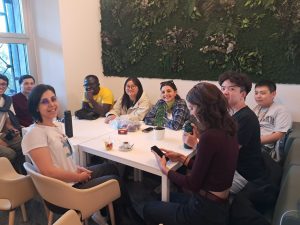
I concluded that the World Food Forum flagship event, if well sustained and enhanced, would serve as the globe’s most important youth-led and action-driven gathering to save the world’s food systems

Let me take you one-step back to the genesis…
MY ROOMMATES
The World Food Forum organizing team, in my opinion, strategically set the tone and grounds for strong inter-country bonding, meaningful networking, learning and knowledge sharing from the very on-set.

One of the ways they did this was by putting and grouping WFF youth delegates from different countries in hostels.
In my hostel room, for instance, was Clara Citra Arundhati from Indonesia, Pragya Devkota from Nepal and Mariam Abdelhady from Egypt.
We bonded so well and, within this very short period of stay, I had already picked up so much positives, and learnt so much. I believe they did same too.
Clara for instance, is an organized “freak”; always on time, and always on-point. She was always the one to wake up first, tidy her bed, take her shower and gets working straightaway on her laptop.
Pragya is always willing to share or help everyone out with something. She went as far as sharing her culture with me, when she explained and even gave me a Tinki or the “bindi” – the traditional mark on my forehead.
Mariam from Egypt is more of a slow-paced calculated type of person; smart, full of life and commitment to duty.
Before we left our hostels to the UN FAO building, we had already gotten so acquainted and, possibly, half way through discussing our respective on-going WFF projects and establishments in our respective countries.
Within two days of interactions, with my roommates and other WFF representatives, I quickly came to understand and appreciate different cultures, practices, dressing, and sampled food types.
MY BANGLADESH FOOD EXPERIENCE
I was privileged to try out the mini pack spaghetti from Bangladesh, which Anaeth Rafi offered me.
This was super tasty, exactly how I like and eat my spaghetti in Ghana but, most importantly, it made me equally realize a little bit of food and taste similarities between Ghanaian and Bangladeshi cuisines.
LESSONS FROM INDIA
I also took some “awakening” lessons from the Indian WFF representatives, which, again, made me conclude that one should always try to be more intentional and “prepare-beyond” before travelling.

Rome is beautiful, welcoming, friendly, and safe, with beautiful souls all over.
On one of the days, Anthony Aidoo (Ghana’s WFF Chair) and I returned to the hostel a bit hungry. We then decided to step out, walk around a bit, to look for an African restaurant where we could eat.
After moving around in cycles, getting lost within our vicinity, we could not locate any African restaurant. We later settled for a nice Italian community restaurant where we had our meal.
Soon as we returned back to our hostel, we met our Indian WFF friends who were readying up to eat their own well prepared food from the hostel’s kitchen.
All we said to ourselves was – how come we didn’t think about this? We could have just entered the grocery shop, purchased some raw food items, and cooked our meal! Anyway, thank you, WFF India, for teaching us to “prepare-beyond” and be “intentional”.
This lesson can be applied anywhere, at any point, beyond food – Thank you India!
OPENING OF WFF FLAGSHIP EVENT
The opening event of the World Food Forum could be described in one simple Italian word – “Eccezionale” (Exceptional).
It was youth-led, youth-driven; simple style and language. That, got everyone’s attention.
The energetic Global WFF Heads, including the head of the local youth action took turns to present the activities of the week to us, the audience.
Each had their unique style of presentation but, what stood out from each was the commitment to action, the passion and power that was noticeably blended and integrated as they stood boldly, confidently -tall ,and delivered their speeches.
It was for me, another demonstration and confirmation that, when the youth are empowered, given the platform and are charged up, they are able to lead, influence and impact – a demonstration of CAN-DO-SPIRIT, at its highest peak on the main stage of the WFF.
Bravo to the UN FAO and WFF leadership. I remain confident that leaders across the globe will take it up to consciously give us, the youth, the needed platforms, to enable us open-up our wings and fly like eagles.
MAKING FOOD FASHIONABLE – SEEING FOOD THROUGH CULTURE
Another stand-out and impactful area, for me, was the absolute uniqueness in dressing amongst all delegates

Countries were not just represented by name. No! We were represented by our culture, through our dressing. Culture and Food truly go together, and it is so right that WFF gave us the opportunity to better understand this in real terms.
One thing I observed as well was that everyone in cultural or traditional outfit moved about with a higher degree of pride, confidence and positive-out-of-this-world energy.
For me, it is important that WFF has culture as part of its core bracket and, most importantly, allow every participant to rock their own culture.
Another lesson I picked again was, possibly, the strategic effort by the WFF team to instill confidence, diversity, positivity and energy in the youth through culture; as we build a path in embracing and advancing our food systems.
ENGAGING YOUTH IN FOOD DISCUSSIONS THROUGH PRACTICAL AND DIGITIZED APPROACHES
Another eye-catcher for me was the digitized set-up spots at the main hall; what I would call – The Hall Of Fame & Food.
Youthful, appealing, inclusive, engaging and attractive, are just the appropriate words to describe it. Everything was a learning.
Let me give you some examples:
Picture Taking: Before you jump on the 360 photo booth, you needed to hold a mini-plague card that had different contents and information on Food systems. I ended up taking so many pictures, not just for the fun of it but, also, for the information on the plague cards and the lessons that accompanied it.

It was equally inspiring for me to meet and take a picture with Morgan James, the creator of one of the digitalized photography zones.
These are down-to-earth ways of engaging the mind of the youth, and I remain confident that WFF chapters equally got this, and that we can all replicate it in our countries – LEARNING THROUGH CONTENT CREATION.
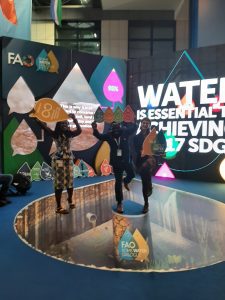
Souvenirs: More often than not, we all attend events and are given souvenirs. WFF had a different way of sharing souvenirs. I call it the LEARNING TO EARN APPROACH.
Over 100,000 souvenirs were possibly given out, but not without one learning something before earning it. My roommates, Mariam and Anthony, Ghana’s Chair earned WFF beautifully branded T-shirts, broche, bags, and bottles but, through it all, I got to learn so much about WFF water management, food waste management, and the International plant treaty.
I also got to follow the social media pages of WFF chapters in other countries that I did not even know had WFF Chapters. This was exciting for me but, most importantly, I learnt quite a lot.
ENABLING THE AGRI-YOUTH THROUGH DIALOGUES
Innovative food systems sessions were held throughout the five-day period. I had the opportunity to participate in a number of them.


All were quality sessions and, back in Ghana, we have already had discussions on how these lessons would feed into our 2025 WFF Ghana Chapter Activity Agenda.
The Regional Chapter side event was powerful, where other countries also got to share their focus areas. Ghana also took her turn.

BHUTAN’S MINDFUL THEMATIC FOCUS
One take-home that I intend to instill at all levels is on “mindful leadership” and its role in shaping sustainable Agrifood systems. This idea was seamlessly delivered by Bhutan WFF Chapter.

Below is a key quote from Bhutan:
“Mindfulness is about being fully aware of whatever is happening, without the need to control or judge it. It helps us navigate the complex interplay between development, sustainability and spirituality” – Mathieu Ricard.
NEPAL’S TASK FORCE
I admired Nepal WFF Chapter’s localized strategic approach of ensuring an increase in youth engagement and involvement across all their provinces. They have established the WFF Youth Task force in all seven provinces.

I am happy to share that, WFF Ghana have equally adopted same measures and put in place Regional representatives in eight, out of our sixteen Regions. We hope to have this across the sixteen regions of the country.
PERU’S CHALLENGES – A CLARION CALL
I could also identify with some of the challenges the Peru WFF Chapter highlighted in their presentation, especially on malnutrition and anemia.
This is a clarion call to all of us to act in our quest and commitment to develop and sustain our food sectors. We have a task, a job and lots of work to do – we have a global task to curb malnutrition.
FAO’S KEN SHIMZU’S MESSAGE – A CAUSE FOR REFLECTION

I would also like to touch very much on FAO representative for Bhutan and Nepal, Mr. Shimzu’s message on the potential of the youth as leaders in breaking barriers and undertaking collective actions to shape the future of sustainability. This message rather got me reflective. For instance, I started asking myself: “how do I become a global leader?”
At the end, I concluded that the onus lies with us to keep asking ourselves this question daily. We should be on a path to have a unified front in achieving our collective WFF mandate and living our purpose, if we sincerely address this question.
This WFF Chapters’ side event was, for me, powerful, and a great time for us to pick up our mantles and be totally committed to driving change.
DID GHANA WFF CHAPTER MISS AN OPPORTUNITY?
Now, this is an opinion article and the whole idea here is to put in writing, my personal views which may, or may not, resonate with all.
I am equally trying here to be professionally objective and sincere as much as I can.
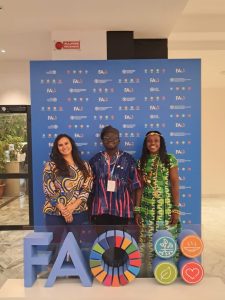
For me, it is the learnings that is important here; the take backs, and how we can collectively improve. Most often, we learn through failure. The beauty of rising up again from our fall is actually when you realize that you have another chance to pick up your baggage and turn it out around positively.
All countries present made resounding presentations, in respect of their countries. I think for Ghana, we blew it off a bit . We sort of missed an amazing opportunity to speak and present our country’s works and impact. We diverted and possibly deviated to a large extent.
In Ghana, our WFF chapter have sincerely been doing amazing works, which has often garnered media attention.
and made tremendous impact
For example,
- We Leveraged on partnerships to lead food sustainability sessions on developing policies to advance the work of women farmers with disabilities in the Western North Region of Ghana.

- We also took center stage during the National Poultry Day, where we promoted the relevance of nutrition and how the youth can take up and develop their career in the poultry sector.


3. We also facilitated the training and capacity building session for more than four hundred youth across the country on managing an agribusiness project.

4. We also organized one of the most successful youth events during the International Youth Day in Ghana.
Beyond this, we have held about four webinars on Education, culture, project management, social protection, for our members across the country.

We have put in place key plans and activities to further strengthen our chapter and impact communities.
We had so much to share during our side event presentation but we missed it completely.

We have learnt a lot in embracing a unified front, and we are already implementing measures that are strengthening our structure, our communications and our collective direction as a chapter.
PLANNING TOWARDS 2025
Our number one priority now is focused on developing our Ghana WFF flagship event – The Youth In Action Food Forum. We also intend to continue hosting strategic webinars and localized training sessions at our Regional level.
 We are also plotting and planning ahead of the 2025 International Youth Day celebration, whilst continuing our efforts in leveraging on strategic partnerships, with both the public and private sectors.
We are also plotting and planning ahead of the 2025 International Youth Day celebration, whilst continuing our efforts in leveraging on strategic partnerships, with both the public and private sectors.
In 2025, Ghana will certainly not miss such an amazing opportunity, if given the platform. We are coming out stronger and well-shaped.
We appreciate the WFF platform for this practical growth and leadership lesson.
FOOD POWER
 YES! Food was present! On the 8th floor of the UN FAO building was food from across the globe being served.
YES! Food was present! On the 8th floor of the UN FAO building was food from across the globe being served.
I realized the similarities in our foods and nutrition as well. I tried out almost every dish by day, during lunchtime and, I again concluded that one key thing that unites the world is FOOD.
I was also impressed with the Food Waste Management systems that were put in place. The lady in charge of this session, Christiana from Austria, was so polite, taking me through the process.

BY THE FIRE SIDE
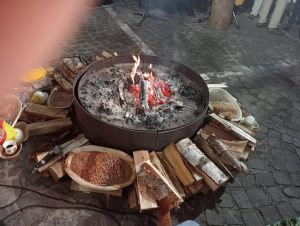
At the ground floor were also the food tents, where chefs from different countries cooked food each day for sampling.

I was blown away by the “fireside” set-up scene, as well as the “story-telling” component in the tent each evening; and, oh my God, the food I got to sample each day was beyond tasty. Absolutely delicious!

I picked up a lot of lessons from the South African chef, Marie, who took time to share the insightful background of her food cooking, passed down to her. She also spoke of the traditional values of the species and ingredients she uses in cooking.
I also got to pick a lot from the Ghanaian chef, Abiro. I learnt of things I never knew about some of our own local dawada and prekese spices whilst in Rome. Wow!
UNIFYING FRIENDS THROUGH FOOD
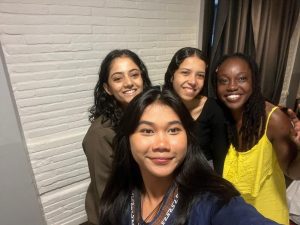
It is exciting and life transforming the kind of results one can collectively gain from stronger platforms and a gathering like the World Food Forum Flagship program. The networking produces solid outcomes.
My roommates Clara, Pragya and Mariam, from across global boarders, are now more of friends. We all get along so well and, most importantly, respect and value our diverse cultural backgrounds.
We have created a “Roommate WhatsApp page” where we share information and check up on one another.
Ester from Armenia and Hojeong from Korea, were the first two, we met and we instantly bonded. We went for a long walk together, picking some few things and, in the process, learnt so much about our respective countries; from food, relationships, practices, to valuable insights.
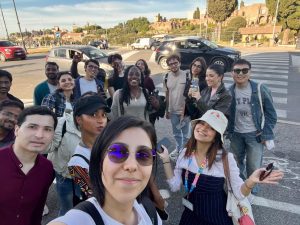 From Ghana, my home country, I got to meet vibrant and energetic people I may never have met or interacted with, if not for the World Food Forum platform.
From Ghana, my home country, I got to meet vibrant and energetic people I may never have met or interacted with, if not for the World Food Forum platform.
Haruna is an example of a young and vibrant soul, doing so much in the transformative research space.
 I also got to strengthen my professional relationship with Alina Johnson
I also got to strengthen my professional relationship with Alina Johnson
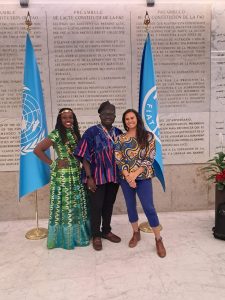
I also met and had a beautiful conversation with the amazing Ghanaian-Jamaican presenter, – Dr. Rachel V. Brown, who moderated a number of sessions.
I am now in touch with so many awesome people from Uganda, Nigeria, Rome, Ireland, Zimbabwe, USA, Pakistani, Bangladesh, Nepal, Egypt, India, Indonesia, Germany… They are countless.
 Most importantly, the Ghana WFF Chair, Anthony Aidoo, and myself, had a lot of catching up to do.
Most importantly, the Ghana WFF Chair, Anthony Aidoo, and myself, had a lot of catching up to do.
We sat down almost every evening, or morning, to discuss the outcomes of each day and how it could influence our growth at the local level, Ghana.
I am now in touch with so many awesome people from Uganda, Nigeria, Rome, Zimbabwe, USA, Benin, Brazil, Malawi, Ireland, Austria, Senegal, UK, traditional leaders from Ghana, and the vibrant Nabiha from Pakistan
Sahki from Bonn and I have equally stayed constantly in touch, sharing ideas and discussing works and projects.
THE SPEAKERS
I would need days to write on the speakers, really. However, it may just suffice for me to say that the line-up was great. I cannot even imagine the works and efforts that went into pulling together world leaders, world experts, impassioned change-makers, and visionary leaders of all ages into one room.
BEST PRACTICES IN MOBILIZING YOUTH-LED ACTIONS AT THE LOCAL LEVEL TO ACHIEVE MORE SUSTAINABLE AGRIFOOD SYSTEMS
Indonesia, Ireland, Qatar, Brazil and Ghana WFF Chapters, had the opportunity to dialogue at the local main stage of WFF, to share insights into how our local approaches are contributing to advancement in the food systems of our countries.
 This was one of the major highlights of the week-long flagship event.
This was one of the major highlights of the week-long flagship event.
The evening was great as we had the chance to listen to, and equally learn from FAO representatives in other countries before our session began.
We also watched some amazing performances and the successful official launch of about twelve new WFF Chapters. This came as the climax of that session.

The initial plan was for each WFF Chapter to deliver a speech. This later changed to a panel presentation ,The lesson here was for us to be always prepared. Every Chapter made impactful submissions, on their respective localized youth actions approaches climaxing the evening and ushering us to the launch of additional national chapters
JUNIOR FARMERS – GROOMING OUR AGRI-FOOD GENZEES
Seeing the young boys and girls, ages 5-13, further revived my confidence in the future of our food systems.
 I smiled as I saw these active young ones walk through and take centre stage. They were practically involved in so many hands-on activities. They were so focused, so into their session. I only smiled but, behind my smile, was hope and confidence being strengthening.
I smiled as I saw these active young ones walk through and take centre stage. They were practically involved in so many hands-on activities. They were so focused, so into their session. I only smiled but, behind my smile, was hope and confidence being strengthening.
 It is important we catch them young. It is important for them to understand the task they have ahead. Thank you, WFF, for allowing them to understand their task in the most practical simplest ways.
It is important we catch them young. It is important for them to understand the task they have ahead. Thank you, WFF, for allowing them to understand their task in the most practical simplest ways.

SITTING IN A SESSION OR WALKING THROUGH THE HALLS
World Food Forum Global office – You are top-notch! From concept to finish, from beginning to end, you have ensured to get us all thinking, to re-energize us, to get us talking, to get us initiating. Every stage, every walk, every stop, was a learning point within the UN FAO walls; a learning pinnacle.
You have driven us to the riverside, and now, we need to drink, and we have no option than to take some key and concrete youth-actions.
Thank you for making each minute count – whether we are sitting in a session or walking through the halls.
Some few Take-Homes:
- Make the most and best of everything
- Be more intentional about activities that would drive and strengthen the youth to take action
- Create a learning and capacity building experience through photography, branding, souvenirs
- Develop youth friendly programs with the youth, for the youth and by the youth
- Involve the young ones – catch them young
- The future is Food and the Future is NOW!
PRESSING TOWARDS THE GOAL – GOOD FOOD FOR ALL, FOR TODAY AND TOMORROW”
From all the learnings and take-homes at the WFF halls and walls, I conclude with this; the actions that we take today will ultimately influence our tomorrow’s food systems.

I am also believing all the more that the World Food Forum platform remains one of the world’s most transformative and influential platforms capable of successfully shepherding the world towards achieving sustainable Good Food for All.
This goes beyond a mere slogan really.
The global WFF Flagship event is contributing to nurturing and empowering our collective global commitment to ending hunger and building resilient food systems that can withstand the challenges of tomorrow.
From all observations and interactions, I believe, as WFF Country Chapters, we appreciate the task ahead as well, to continue to galvanize youth action, activate innovation and initiate investment for the achievement of a better food future for all.
This is possibly our purpose, our calling, and our lifetime mandate; to shape the conversations on food actions, food approaches, food innovations, food modules, food systems, food practices, youth-led food actions, and local food actions that are proactive and contributes to sustainability.
I am convinced that we are ready and capable, as a team, to deliver sterling performance in achieving this task.
Good Food for All, for Today and Tomorrow”.
The above is just a few of my reminiscence, my nostalgic recollect, nevertheless, believe me when I say that the World Spoke Food at the World Food Forum!
By Alberta Nana Akyaa Akosa, National Director, WFF Ghana Chapter







